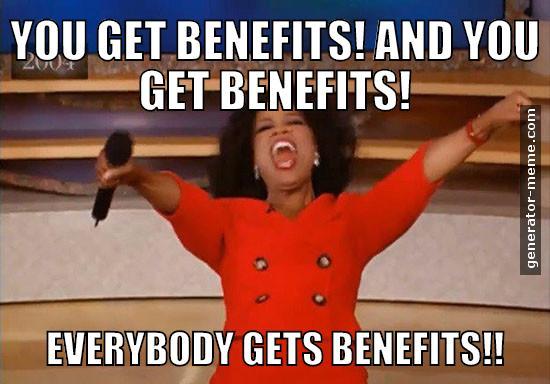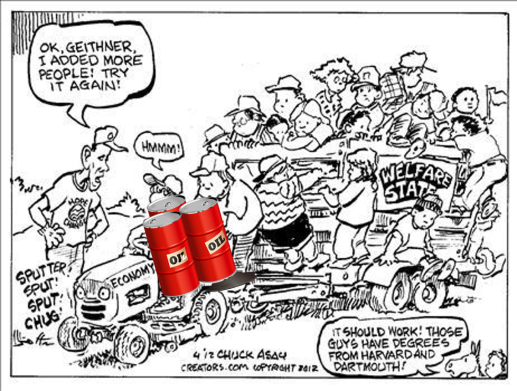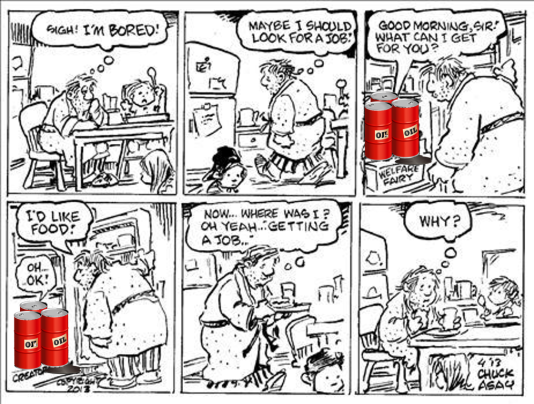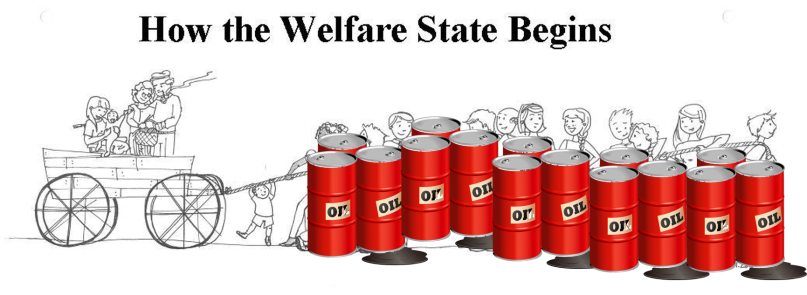Before we dive back into the News Reel stuff – oil price, the economy, future prospects, the “what does this mean for me” and “how does this impact me” stuff – that I talked about in my last post and even the personal money management, work and career, LIFE as an independent(ish) adult stuff, I feel a strong inclination to first ~set the scene~ and provide you with a little context and back story to flavour the rest of your reading.

It’s no secret that Brunei is the epitome of a welfare (or shellfare) state.
And because this is such common knowledge, let me just quickly say that I’m not going to break this down into a ridiculous amount of detail and write an entire paper exploring what this is, what it means, whether it’s a good thing or a bad thing, and I certainly will not be jumping down the rabbit hole of discussing the monarchical system and whether an alternative system of governance would be better/worse/possible/desirable.
(Maybe another day but don’t hold your breath.)
The one key point I would like to make right now is:
It’s extremely clear – not just to me, but also to the the high-level Ministerial figures, the Monarch himself, the international think-tanks, the media, and hopefully to the more socioecopolitically-aware Bruneian public – that the current welfare system, in its current manifestation, is inefficient, short-sighted, and unsustainable in the long run.
Google definitions starts us off with this:
welfare state (noun)
a system whereby the state undertakes to protect the health and well-being of its citizens, especially those in financial or social need, by means of grants, pensions, and other benefits.
What does that mean?
A welfare state is characterized by copious amounts of freebies, goodie bags, and hand-outs – basically, FREE STUFF YEAY!! You need not lift a finger and work for any of these things; it’s all either completely free or heavily subsidised (that means you get a big discount and it’s as cheap as chips because the government pays for most of it).
The Sultanate of Brunei Darussalam boasts:
- FREE healthcare! You only have to pay a BND $1 registration fee for each visit. Parking is sometimes not free (god forbid!) and you might have to pay per hour. There have been complaints.
- FREE education! All the way until you’re done with high school, and even beyond that there’s a lot of financial aid available – ranging from monthly student allowances all the way to fully sponsored scholarships. All textbooks are provided for free rental at public schools, and examinations are free too.
- NO TAXES! No income tax, no sales tax, nobody even really knows what tax is. However, there is a road tax which must be paid annually for every vehicle (~BND$25 per year) and land tax (~$10 per year).
- GENEROUS HOUSING SCHEMES! Put your name on a waiting list, sit back, be patient and goyang kaki for a number of years – BOOM congratulations, here’s a ridiculously cheap house which we will “sell” to you at no interest. Monthly payments? Maybe a hundred bucks or so every month for the next 25 years which we will automatically deduct from your salary.
- SUBSIDIZED FUEL! Premium RON97 petrol is 53 cents per litre; apparently the 9th cheapest in the world. Cooking gas (LPG) is cheap too, I think it’s around $8 for a tong (cylinder). Apparently it’s free in Seria (the Oil Town) and piped directly to homes.
- SUBSIDIZED FOOD! I don’t know the full deets but basic food items like rice, sugar, flour, cooking oil, are either subsidized or price regulated.
I stumbled upon this blog entry by Sagiboy from 2007 which talks about the Brunei welfare system in a bit more detail. I can’t verify whether all his information is accurate since some statements are questionable (does the hospital really provide free milk for newborns? I’m not aware of this being true) but he lists plenty of valuable points so it’s worth a look-see.
A welfare system – in any part of the world – generally starts with smaller programs targeted at a handful of genuinely needy, less fortunate people e.g. the disabled, the children orphaned at a young age, the truly impoverished.

But, in Brunei’s case – after the Oil Boom in the 1960s caused black gold to spring forth from the ground and flood the country with more wealth than it really needed or knew what to do with for its tiny population (approx. 300,000) – the welfare program stretched across the nation and embraced practically every citizen without limitation.

And so the Welfare State was born.
For my own sanity, I’m going to pretend I don’t hear the angry trolls accusing me of not being grateful and inda syukur at the generosity of my own government.
(Cuz das not wat I’m sayin’ bro.)
The burning question you may now have is probably along the lines of: Isn’t providing welfare a good thing? (Yes, but to a certain degree.) To what degree? When does the welfare system become a bad thing? Why do you think it’s a bad thing at ALL?


“To be more specific, if more than 50 percent of the population is dependent on government (employed in the bureaucracy, living off welfare, receiving pensions, etc), it becomes rather difficult to… fix the mess.”
[Disclaimer & disclosure: Don’t know who Dan J Mitchell is and because of that I can’t/don’t endorse whatever broader opinions he may have – but his very short piece on the rise and fall of the welfare state I did enjoy.]
In my search for accompanying images, I found a number of comics that succinctly illustrate the downfalls of a welfare state. However, it’s extremely important to note that these comics were created for a US/UK audience and you can’t directly compare the Brunei welfare situation to theirs.
The reason why the welfare state mentality is so divisive in Western, democratic governments is because the money used to fund welfare programs in these countries is taken from tax-payers pockets. In other words, regular, working, middle-class people like You and I are forced to pay a significant amount of tax (taken away from our salary/income/gaji) – just imagine! 20%, 30% just disappears from your salary – and this money is then used to provide “freebies” for other people the government deem are less fortunate. Siapa jua inda marah. The working class naturally gets angry about this situation, because some “less fortunate” people might just be lazy couch-potato moochers yang malas bekraja, menganggur di rumah saja who take advantage of the system and sucker other people into paying for their stuff.
The stark difference here is that in Brunei, the money used to fund welfare programs – and in fact ALL government spending – comes purely from oil and gas revenue. To this day, 95% of the government revenue comes from oil and gas. If the government has $100 in its wallet, $95 was made by selling the gloopy black substance (and the gas) sucked out of the ground.
You might be thinking:
Isn’t that better? At least this way there’s no “tax-payer” to protest about having money taken out of their pockets; it’s a win-win situation!
It doesn’t really work that way, unfortunately. But that’s a conversation for another day. If you want to do your own reading and research in the mean time, look up: resource curse, rentier state, Dutch Disease, oil curse.(But if you’re extra curious you can always leave a question in the comments section.)
If I’m rajin I’ll look up some reading material and link it up; it’s a fascinating subject I just don’t feel like talking about it right now because I’ve digressed so much already ha ha.
ANYWAY! For today’s purposes, all you need to know is the Brunei welfare state syndrome is unique to resource-rich, smallish countries that derive most of their government revenue/money from the extraction of this resource. These types of countries are also known as rentier states.
Here is the comic intermission to illustrate the downsides and self-destructive nature of welfare states:



However, I did emphasize earlier that these comics were drawn for an entirely different context. So I took the liberty of very professionally editing them so they may reflect the situation in Brunei more accurately:



And finally:



Great post! I loved all the images you added 🙂
LikeLike
[…] personal finance, what it means to be financially independent (especially against a backdrop of a welfare society that’s unintentionally grown complacent and severely reliant on government handouts). […]
LikeLike
I see you don’t monetize your page, don’t waste your traffic, you can earn additional bucks every month.
You can use the best adsense alternative for any type
of website (they approve all websites), for more details simply search in gooogle: boorfe’s tips monetize your website
LikeLike